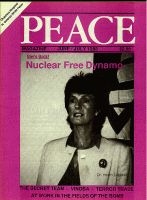
Peace Magazine Jun-Jul 1988, page 18. Some rights reserved.
Search for other articles by Jillian Skeet here
Canada's Stake in Common Security, the NDP's new security policy, was released in April. With it, the NDP has embraced the concept of common security - that, in our age, security can for one nation can only be enhanced by increasing the confidence and security of all.
The NDP's policy builds on the consensus that existed prior to the recent White Paper, that East/West tensions constitute the primary security threat to Canada. It expresses a firm commitment to an active war-prevention policy and to concrete initiatives in the pursuit of a reduction of East/West tensions. It correctly stresses that, as a nation occupying space between two hostile superpowers, Canada must address the security concerns of both. Consequently, it avoids policies that could seem to threaten the security of either the U.S. or the Soviet Union. It stresses the need for surveillance and defence adequate to assure both superpowers that Canadian territory would never be used for aggressive action against either.
The document reveals determination to withdraw Canada from both direct and indirect participation in the nuclear arms race and to establish a new role for Canada as an active peacemaker. This will mean an end to cooperation in testing the cruise missile and a re-ordering of Northern defence arrangements to ensure that, through NORAD, Canada does not become entangled in the U.S. Strategic Defence Initiative or in the Air Defence Initiative. Furthermore, the NDP plans an activist Canadian role within NATO during the first term in office. Canada would press vigorously for arms control and disarmament and for NATO to pledge no first use of nuclear weapons. Military alliances are inimical to the interests of common security. Accordingly, the NDP proposes to withdraw Canada from membership in the NATO alliance during a subsequent term in office.
Canada's Stake in Common Security reflects the attitudes and goals expressed by the Canadian people in a number of recent opinion polls - including those conducted under the auspices of the Canadian Institute for International Peace and Security, the North-South Institute, and External Affairs.
Bill Blaikie, NDP Foreign Affairs Critic, has responded by phone to several of my questions.
Skeet: Some critics argue that Canadians are opposed to large military expenditures and will not accept the costs associated with this policy. Does the NDP anticipate that this will pose a problem in implementing its policy?
Blaikie: In the paper we've not tried to put a price tag on the policy, although we hope to say something in the near future. People's attitudes to defence spending have to be seen in context. Defence spending has, in the past, been seen as preparing for war and, consequently, people have a negative attitude. This is both understandable and even desirable. The situation could change which you make the transition to a common security system. It could well be that Canadians would have quite a different attitude towards a system of war-prevention. You can either spend money like Perrin Beatty proposes to do, on nuclear powered submarines and nuclear war fighting strategies, or you can focus on measures to prevent war.
Skeet: Does the NDP have any specific plans for getting its message out to the Canadian people?
Blaikie: This policy is something that can be taken to the Canadian people-some thing that offers an alternative view for global security and a secure future. The NDP is the first party to embrace the concept of common security. What is significant for the peace movement is that the NDP will be more aggressive in promoting its alternate view. We have taken those things that have been associated with NDP foreign policy in the past, like withdrawal from NATO, and have placed them in a framework. Many oft he concepts have long been in the minds of the NDP but have never before been articulated. This policy expresses the kind of world we are working toward with such policies as pulling out of NATO.
Skeet: Critics of the new common security policy also question the rationale of withdrawing from NATO during a second term. Criticism ranges from accusations of cowardice for stepping back from the previous policy to the criticism that, by stating we will leave the alliance, Canada will lose any influence we may have on NATO's policies. What is the NDP's response to such criticism and what role in NATO is envisaged during a first term in office?
Blaikie: We have not necessarily stated that withdrawal will take place at the beginning of a second term. There would be no mechanical commitment for withdrawal. We have laid out for ourselves enormous tasks during a first term. We need priorities. It would have been unreasonable and dishonest to say that we could do it all in the first term. The argument that withdrawal would reduce our effectiveness is exaggerated. We participate in many other other places. We've never really tried to exercise our influence so we don't know how effective we would be.
Jillian Skeet is Executive Secretary of the Group of 78.

Peace Magazine Jun-Jul 1988, page 18. Some rights reserved.
Search for other articles by Jillian Skeet here